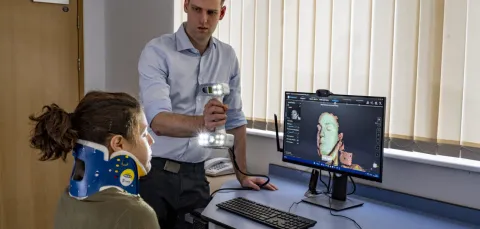Our impact
We work closely with partners to provide the evidence needed to deliver work class patient centred care. People we work with include:
- those affected by skin health issues
- healthcare professionals
- health professional organisations
- NHS England
- UK charities
- policy makers
- research funding agencies
- trade associations and global corporations
- regulatory bodies like the Medicines and Healthcare Products Regulatory Agency
- international standards organisations (ISO)
Our projects have real-world impact. Our findings inform clinical guidelines and international standards for device testing. They also shape the design and development of:
- new medical devices
- support surfaces
- sportswear
- consumer products
Research with impact
Sweat research to inform women’s sportswear design
We also cooperate with global goods manufacturers to improve the design of absorbency products for babies and adults, as well as anti-perspirant deodorants. We achieved this by modelling the biophysics and physiology of wetness of the skin.
Learn more about the impact of our research
Explore our Research Excellence Framework 2021 case studies. Impact case study : Results and submissions : REF 2021
A short summary of the Skin Health REF impact case is detailed below:
The Skin Sensing Research Group at the University of Southampton leads a multidisciplinary consortium to evaluate and optimise cutting-edge technologies. This will improve the safety of interventional and therapeutic medical devices and minimise skin damage in vulnerable patients.
The resulting commercialised devices have had an impact on healthcare practice and patient care. This leads to pressure ulcer prevention and effective wound healing. The underpinning research has shaped new international clinical guidelines.
Working with the NHS, the Group has pioneered the use of sensing technologies to reduce pressure ulcer risk. This resulted in improved patient experience and adoption by four NHS trusts.
The economic impact of co-developed medical products is seen through international sales of advanced support surfaces, and the creation of a spinout company Radii Devices Ltd.
The research has changed national policy for the first time. Device-related pressure ulcers are now part of routine reporting practice across 200 NHS sites. The team have influenced the design of new international device standards.
